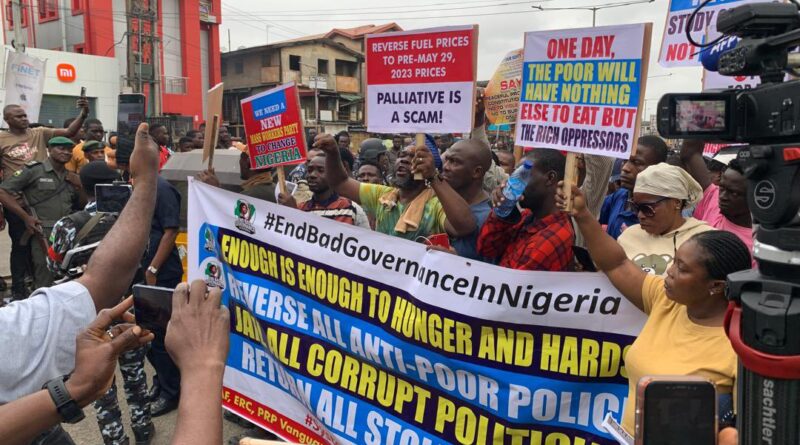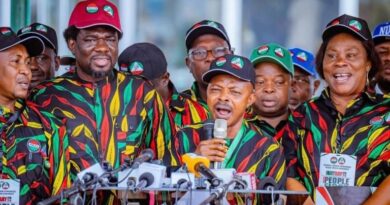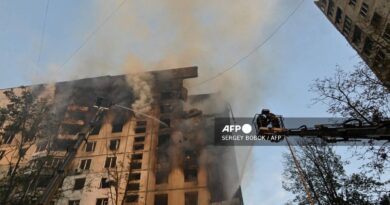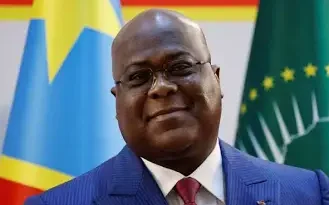A Nation Divided by Hardship: How hunger protests exposed Nigeria’s growing divisions
Early Morning Tension in Abuja
On Thursday, Abuja awoke to a city steeped in tension. At the MKO Abiola National Stadium, hundreds of anti-government protesters gathered, their voices rising against a backdrop of severe economic hardship and corruption. Prominent activists like VeryDarkMan, Deji Adeyanju, and Barr. Kingdom Okere led the charge, with chants of “End Bad Government” and “Bring Back Subsidy” reverberating through the air. Their placards bore stark messages: “We are hungry” and “Tinubu, where is the change?”
Among the protesters was 32-year-old Jane Hingir, who shared her emotional struggle to make ends meet. “I’ve been struggling to make ends meet, but it’s getting harder every day,” she said, her voice filled with a mix of frustration and determination. Jane’s personal story mirrored the broader national struggle, highlighting the everyday challenges faced by many Nigerians.
Among the protesters was 32-year-old Jane Hingir, who shared her emotional struggle. “I’ve been struggling to make ends meet, but it’s getting harder every day,” she said, her voice filled with a mix of frustration and determination. Jane’s personal story mirrored the broader national struggle, highlighting the everyday challenges faced by many Nigerians.
Pro-Government Rally: A Contrast
Meanwhile, in stark contrast, a pro-government rally took place at the Tinubu/Shettima campaign office same day.
Organized by the Tinubu Support Group, the demonstration was marked by a calm and orderly atmosphere. Participants in this rally were given branded T-shirts and faze caps, displaying their support for President Tinubu. Led by Minister of State for Police Affairs, Hajia Iman Sulaiman-Ibrahim, the rally showcased a divided political landscape.
The Dynamics of Hired Protesters
A parallel demonstration involving hired protesters emerged. These individuals, recruited to oppose the anti-government protests, carried placards reading “No Protest.”
Organized by a man who identified himself as Blessing Joel, they said that they were paid N5,000 each to participate. Many of these hired protesters came from the suburbs, highlighting how financial desperation influenced political demonstrations.
Gabriel, an unemployed man from the capital, admitted that he joined the pro-government rally for the N5,000 offered. “I know things are bad in the country and the economy is not working, but the money was a big reason why I joined them,” he revealed. This highlighted how economic hardship often sways political participation.
The March and Its ConsequencesBack to the story: at 12:02 pm on Friday, the anti-government protesters began their march towards Eagle Square. A heavy police presence, including FCT Commissioner of Police Bennett Igweh and security personnel from the Army Headquarters Garrison Command, NSCDC, and DSS, added to the tension. A helicopter hovered overhead, intensifying the atmosphere.
By 12:39 pm, the protesters faced a harsh response at the Central Business District junction near the United Nations building. Security forces deployed tear gas, and reports emerged of a protester being feared shot dead while trying to escape. Despite this, the protesters regrouped at the MKO Abiola National Stadium by 1:50 pm, their determination undeterred.
A Moment of Solace: Friday Juma’at Prayers
In a poignant display of resilience, the Muslim faithful among the protesters observed Friday Juma’at prayers amidst the turmoil. This moment of solemnity stood in stark contrast to the earlier chaos, symbolizing their unity and unwavering commitment to their cause.
We pray for peace, but we also pray for justice,” said Shehu Ibrahim, who led the prayers. The prayers not only provided spiritual solace but also renewed their resolve.Contrasting Responses: Anti-Government vs.
Pro-GovernmentThe treatment of different protests revealed stark discrepancies. Anti-government protests faced severe crackdowns, while pro-government rallies proceeded with relative ease.
This discrepancy drew criticism and highlighted perceived double standards in the government’s approach to dissent. The contrast became a focal point for critics, raising concerns about fairness and justice.
Voices from the Government
Amid the turmoil, government officials weighed in on the situation. The Secretary to the Government of the Federation, George Akume, addressed the nation on Wednesday, warning that the protests could lead to further violence and setbacks. His speech aimed to quell the unrest but failed to appease many.




